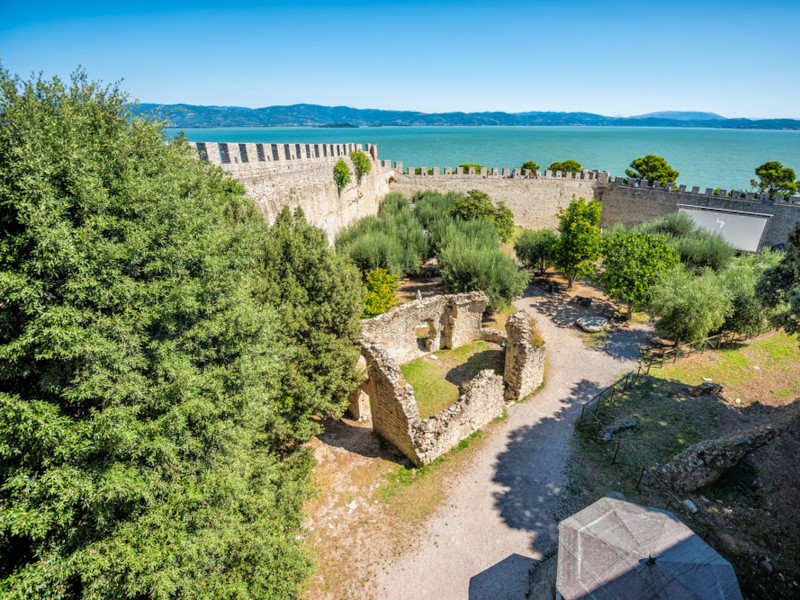Castiglione del Lago
Castiglione del Lago is a town in the Province of Perugia of Umbria (central Italy), on the southwest corner of Lake Trasimeno. Orvieto is 59 km (37 mi) south, Chiusi is 21 km (13 mi) to the south west, Arezzo is 56 km (35 mi) to the north west, Cortona is 21 km (13 mi) to the north and Perugia is 47 km (29 mi) to the south east. Geography and urban structure Castiglione del Lago has evolved on what used to be an island - the fourth island of Lake Trasimeno, in its south west region. Over the centuries, as the town grew, the flat gap between the island and the shore was filled with piazze, houses, churches and other buildings. The newest parts of the city are at some distance from the old, so the centro storico (historical center) of Castiglione del Lago is a well preserved medieval locality that seems to be governed by a "law of threes". In the town walls there are three gates, and inside the town there are three piazze and three churches. History Castiglione lies on the once important highway between Orvieto to the south, Chiusi to the west, and Arezzo to the north. Its position in this hotly disputed territory, pitting Etruscans against Romans, and later Tuscans against Perugians, inevitably brought a long cycle of death and destruction to the town. The original fortifications were destroyed and rebuilt on numerous occasions. It was only during and following the reign of Emperor Frederick II (early 13th century) that a period of relative stability ensued. Later the city fell under the control of Perugia, within the Papal States, becoming the fiefdom of the powerful Baglioni family. In 1550, Pope Julius III bestowed it upon his sister. In 1563, her son, Ascanio della Corgna, became the Marquis of Castiglione and Chiusi. The fiefdom became a prosperous, but short-lived Duchy in 1617. The last Duke Fulvio Alessandro (1617-1647) died without heirs and the town was re-absorbed into the Papal States. Main sights The Castello del Leone ("Fortress of the Lion") was built by Emperor Frederick II. The pentagonal-shaped castle, was completed in 1247 CE by the monk-architect Elia from Cortona. The castle features square towers in four of its corners and a triangular shaped bastion, or donjon, known as the Mastio in the other. The castle was designed to give its owners strategic control over all of Lake Trasimeno. The castle has withstood a number of sieges over the subsequent centuries. The Palazzo del Comune (Town Hall) was built by Ascanio della Corgna in Renaissance style, designed by the architect Vignola. It is now a civic museum and gallery. The palazzo has by a long, covered corridor connecting to the castle. Renaissance era frescoes by the Pescara-born artist Giovanni Pandolfi and the Florentine artist Salvio Savini adorn the main floor inside. In 1574, the artist Niccolò Circignani, known as "Il Pomarancio", added paintings and other decorations to one of the most interesting rooms in the palazzo, the so-called Room of the Exploits of the overlord Ascanio della Corgna. The only other building of particular note is the finely stucco-ed Church of Santa Maria Maddalena, done on a Greek-cross plan. The church has a neo-classical pronaos and, inside, a panel painted in 1580 by Eusebio da San Giorgio. Festivals and events Every two years, Castiglione del Lago is the host of the Coloriamo i Cieli festival. The "Colour the Skies" event is held on no fixed date in late April or May. Since 2005, however, this festival has been held annually and now includes light aircraft (nearly 2000 in 2007), hot air balloons (17) and thousands of multi coloured kites. Sources Maria Gabriella Donati-Guerrieri, Lo Stato di Castiglione del Lago e i della Corgna, La Grafica, Perugia 1972. See also Lake Trasimeno External links Official website Bill Thayer's Gazetteer of Italy

